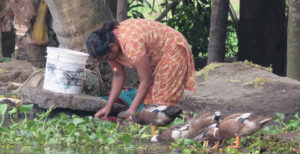India and Pakistan early heatwave 30 times more likely because of climate change – attribution study
Since the beginning of March, India and Pakistan and large parts of South Asia experienced prolonged heat, that at the time of writing, May 2022, still hasn’t subsided.
March was the hottest in India since records began 122 years ago and in Pakistan, the highest worldwide positive temperature anomaly during March was recorded and many individual weather stations recorded monthly all-time highs through March. At the same time, March was extremely dry, with 62 percent less than normal rainfall reported over Pakistan and 71 percent below normal over India, making the conditions favourable for local heating from the land surface. The heatwave continued over the month of April and reached its preliminary peak towards the end of the month. By the 29th of April, 70 percent of India was affected by the heatwave.
While heatwaves are not uncommon in the season preceding the monsoon, the very high temperatures so early in the year coupled with much less than average rain have led to extreme heat conditions with devastating consequences for public health and agriculture. The full health and economic fallout, and cascading effects from the current heat wave will however take months to determine, including the number of excess deaths, hospitalisations, lost wages, missed school days, and diminished working hours. Early reports indicate 90 deaths in India and Pakistan, and an estimated 10-35 percent reduction in crop yields in Haryana, Uttar Pradesh, and Punjab due to the heatwave.
Read more on WWA website.
More
Study authors:
Mariam Zachariah1, Arulalan T2,3, Krishna AchutaRao2, Fahad Saeed4,5, Roshan Jha6, Manish Kumar Dhasmana6, Arpita Mondal6,7, Remy Bonnet8, Robert Vautard8, Sjoukje Philip9 , Sarah Kew9 , Maja Vahlberg10, Roop Singh10, Julie Arrighi10,11,12, Dorothy Heinrich10, Lisa Thalheimer13,15, Carolina Pereira Marghidan11, Aditi Kapoor10, Maarten van Aalst10,11,14, Emmanuel Raju16, Sihan Li15, Jingru Sun17, Gabriel Vecchi17,18, Wenchang Yang17, Mathias Hauser19, Dominik L. Schumacher19, Sonia I. Seneviratne19, Luke J. Harrington20, Friederike E. L. Otto1
1 Grantham Institute, Imperial College London, UK
2 Centre for Atmospheric Sciences, Indian Institute of Technology Delhi, India
3 India Meteorological Department, Ministry of Earth Sciences, Gov. of India
4 Climate Analytics, Berlin, Germany
5 Weather and Climate Services, Islamabad, Pakistan
6 IDP in Climate Studies, Indian Institute of Technology Bombay, India
7 Civil Engineering, Indian Institute of Technology Bombay, India
8 Institut Pierre-Simon Laplace, CNRS, Sorbonne Université, Paris, France
9 Royal Netherlands Meteorological Institute (KNMI), De Bilt, The Netherlands
10 Red Cross Red Crescent Climate Centre, The Hague, the Netherlands
11 Faculty of Geo-Information Science and Earth Observation (ITC), University of Twente, Enschede, the Netherlands
12 Global Disaster Preparedness Center, American Red Cross, Washington DC, USA
13 Princeton School of Public and International Affairs, Princeton University, Princeton, NJ 08540, USA.
14 International Research Institute for Climate and Society, Columbia University, New York, USA
15 School of Geography and the Environment, University of Oxford, UK
16 Department of Public Health, Global Health Section & Copenhagen Centre for Disaster Research, University of Copenhagen, Denmark
17 Department of Geosciences, Princeton University, Princeton, NJ 08544, USA
18 High Meadows Environmental Institute, Princeton University, Princeton, NJ 08540, USA
19 Institute for Atmospheric and Climate Science, Department of Environmental Systems Science, ETH Zurich, Zurich, Switzerland
20 New Zealand Climate Change Research Institute, Victoria University of Wellington, Wellington 6012, New Zealand
World Weather Attribution (WWA) is an international collaboration that analyses and communicates the possible influence of climate change on extreme weather events, such as storms, extreme rainfall, heatwaves, cold spells, and droughts.
Previous studies by WWA include research that found that climate change exacerbated deadly storms in Madagascar, Malawi and Mozambique earlier this year and the recent floods in South Africa. WWA studies have also shown that last year’s heatwave in the Pacific Northwest region of North America would have been “virtually impossible” without climate change, and that climate change made the extreme floods in Europe in July 2021 more likely, but that it was not the main driver in Madagascar’s 2021 food crisis.






